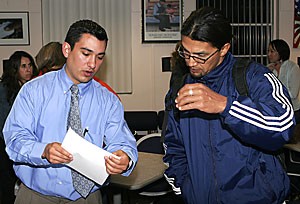Fair treatment, staying informed and reading e-mails were topics of last night’s Proposition 300 forum, where community members and students voiced concerns about the law’s implementation on campus.
An e-mail was sent to students before spring break explaining that the Arizona Board of Regents would be voting to approve amendments to their policies to comply with the law. Now students are being contacted via e-mail whether or not they need to provide further documentation regarding their citizenship and tuition classification.
Proposition 300 affects students who are not citizens, legal residents of the U.S. or who do not have lawful immigration status, and does not allow them to be classified as in-state students.
Although e-mails were sent the entire student body, the actual number of students who need to provide documentation is unknown.
One concern is students deleting the e-mail without reading it and not providing documentation if they are required to do so.
“”We’re trying to make sure students understand the impact of the law,”” said Socorro Carrizosa, director of Chicano-Hispano Student Affairs. “”If you haven’t read the e-mail, it could lead to a serious situation.””
A schedule of when students should make appointments to come in with their documentation is listed on the registrar’s Web site. Failing to provide documentation will result in being required to pay out-of-state tuition as well as being ineligible to receive scholarships or other financial aid from state monies, according to the Web site.
Carrizosa also said CHSA is trying to make sure students are treated fairly during the process of providing documentation.
“”We are very concerned and are trying to work with the people implementing this that students are treated with respect and dignity and the person checking these documents knows that there are boundaries,”” Carrizosa said.
Concerns were raised at the meeting about students with Mexican surnames being targeted to provide documentation about their citizenship.
One of the main ideas discussed was that people might not understand the impact of the law.
“”I’m surprised by how few people are here tonight, I don’t think people even understand the ramifications of this law,”” said Lisa Schwartz, an entomology graduate assistant.
This law is one result of voters’ reactions to illegal immigration issues in the state.
“”These bills are in the legislature because these people are being pressured by their constituents, who are writing letters and making phone calls every day,”” said Jacob Cortez, a member of the Arizona Interfaith Network. “”Unless you do the same and put political pressure on them, these bills are never going to stop.””
On Tuesday, community members and students are planning to meet again at the Movimiento Estudiantil Chicano de Aztlan (MEChA) meeting to come up with specific ideas they are going to try and execute, such as a protest at the state legislature.









